KUALA LUMPUR: Malaysia needs to integrate technology into its economy to escape the middle-income trap, said Deputy Investment, Trade and Industry Minister Liew Chin Tong.
He said Malaysia must prioritise acquiring and incorporating technology into its economy beyond just attracting foreign direct investment to advance.
“Investment is important, but we need to infuse ... infusion of technology is important, and we have to move to innovation. In the New Industrial Master Plan (NIMP), we use the word ‘tech-up’. Tech-up in our vocabulary, we mean more digitalisation, more automation, more AI and more innovation,” he told reporters at the Keynote Lecture: Economic Growth in Middle Income Countries: How Can Countries Escape the Middle-Income Trap today.
He explained that this means adopting technology across all sectors and eventually emerging as innovators.
“This is a trajectory that we have to go through,” he said.
He mentioned that the World Bank defines high-income as earning around US$15,000 (RM70,800) per person which Malaysia is almost reaching.
“It is not difficult to achieve because you’re talking about US$15,000. It can just be the ringgit appreciating that you already reached, because we are already almost there. But it is not so much of just achieving numerical high-income. It is really about the economy becoming a very dynamic, vibrant and technological base,” he said.
Liew explained that this means Malaysia does not just follow others in the economy, but leads as a trendsetter and innovator in technology.
“At that point of time in 1994, the question was, can Malaysia in terms of technology become more like South Korea or Taiwan? We are still asking the same question. We are still dealing with the same question, whether we can be a lot more like South Korea or Taiwan in terms of technology,” he said.
Liew stated that China has rapidly advanced in technology, “leapfrogging” ahead, and has now become an innovator in the field.
“We have to be an innovator, but in order to be an innovator, we need to infuse technology, we need to have a cross-support adoption of technology, and of course we need investment,” he reiterated.
Liew pointed to Malaysia’s comprehensive economic policy framework aimed at modernising and advancing the economy under Prime Minister Datuk Seri Anwar Ibrahim.
He stated that Malaysia aims for its economy to advance in technology, becoming both wealthier and more technologically driven as a society.
“With the Economi Madani framework, followed by the National Energy Transition Roadmap, and followed by, recently Prime Minister launched the National Semiconductor Strategy, together with the new industrial master plan 2030 (NIMP 2030). These are all policy frameworks that we want to guide Malaysia to green transition, to technological upgrade, and hopefully play a very important role in the global semiconductor industry,” he said.
He noted Malaysia’s first economic boom from 1988 to 1997 and hopes for a new period of strong economic growth.
“If we can play a very important role in the global semiconductor industry, which is the frontier industry, and if we can move up from the back end of a semiconductor to more front end, a lot more design, and a lot more technological input, a lot more innovation, we will be moving up not just numerically, not just in the measurement of a high-income country, but genuinely we want to see a second economic takeoff for Malaysia,” said Liew









